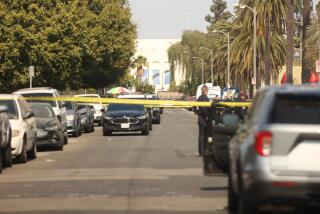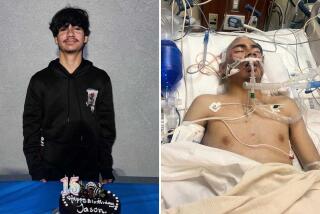Remembrance of an AIDS Victim: Pain and Dignity
Paul Damien Rios died a little more than a year ago. Two weeks ago, his family and some of his friends got together to remember the man they knew as Raulie.
Someone mentioned how he loved to dance, how meticulous he was about keeping things straight, how he had a special flair for arranging flowers and painting. But mostly people recalled how sincerely pleasant Paul Rios was, how he seemed to be one of those rare people who never had anything bad to say about anyone else.
Outside his family and circle of close friends, Paul Rios was not well known. He wasn’t a famous person and he didn’t seek publicity. But to those who knew him, Paul Rios stood for everything that was kind and decent and gentle about the world.
I never knew Paul, but I got to know something about his life because I wrote a story about his mother and a group of other women involved in Mothers of AIDS Patients.
Paul Rios was gay, and he died of AIDS on Dec. 1, 1987. He was 32 years old.
By the time I interviewed Irene Rios, Paul and his lover, Greg, had already died of the disease. She told me that she was having difficulty with the loss, that it still pained her to look at his picture, and that she found comfort in clutching the brass urn that holds his ashes.
The story ran in the Orange County Life section of The Times in November, and three weeks ago I returned to Irene Rios’ Mission Viejo home to participate in a family tribute to her son.
More than 50 people showed up to remember Paul. It could have been a wake, but it turned into a celebration of life, a time to remember how one young man had touched the lives of so many.
Paul grew up in Los Angeles, the oldest son in a devoutly Roman Catholic family, enrolled in a seminary, dropped out and eventually went to Cal State Los Angeles. He moved to San Francisco, back to Los Angeles and then to San Diego, where he worked as a floral designer. He came home to his mother’s house in Mission Viejo to die.
As I listened to the people talk about this man I never knew, the enormity and pain of the AIDS crisis hit me as never before. It impressed me how the death of one person can affect so many, and it struck me that these kinds of things must be going on all over the country. So many young people have died of AIDS, and so many more seem destined to die.
But what impressed me most about this story was the dignity with which this typical family handled a very personal tragedy. Perhaps it was the absence of so many flaws and emotions that make us all human--fear, ignorance, rejection--that made this family different.
There was, for example, an appreciable lack of denial among most of those who knew Paul.
Love and Support
Few questioned Paul’s homosexuality when he came out of the closet 12 years ago. And when he contracted AIDS, there was enough love, support and kindness to help cushion his fall.
When I wrote the story about Paul, I dealt with those who knew him best, his mother and brother, and how they had stood by him despite the ignorance and prejudice that filled most of his adult life. I regret now that I failed to mention Charles Stalker, Paul’s stepfather.
Stalker is a thin, quiet man who opened his home and heart to Paul as if he were his own son. Ask him about it and Stalker, an accountant, will dismiss it as if every man would treat his gay stepson the same way. Charles Stalker is a remarkable man.
“I could not have done it without his help,” Irene Rios said of her husband. “When Paul’s fevers were raging between 106 and 107 degrees, Chuck would come home and jump right in there and help me. He’d help bring down the fever and then make dinner. He was a real trouper. Chuck was more of a father to him than anyone.”
Rios said she decided to hold the tribute because “I didn’t want the year to go unnoticed. Paul’s life meant too much to all of us. It just seemed like the right thing to do, putting to rest this first year and moving on. For me it was a way of saying, ‘OK, I’ve made it through this first year and I can continue to move on and do the work that Paul would want me to do.’ ”
That work is continued involvement in the local chapter of Mothers of AIDS Patients and the Los Angeles chapter of Parents and Friends of Lesbians and Gays.
Paul Rios is gone, but he died with dignity and the love of his family and friends. Irene Rios would like to make sure that others who die of the disease are afforded those same rights.
More to Read
Sign up for Essential California
The most important California stories and recommendations in your inbox every morning.
You may occasionally receive promotional content from the Los Angeles Times.










